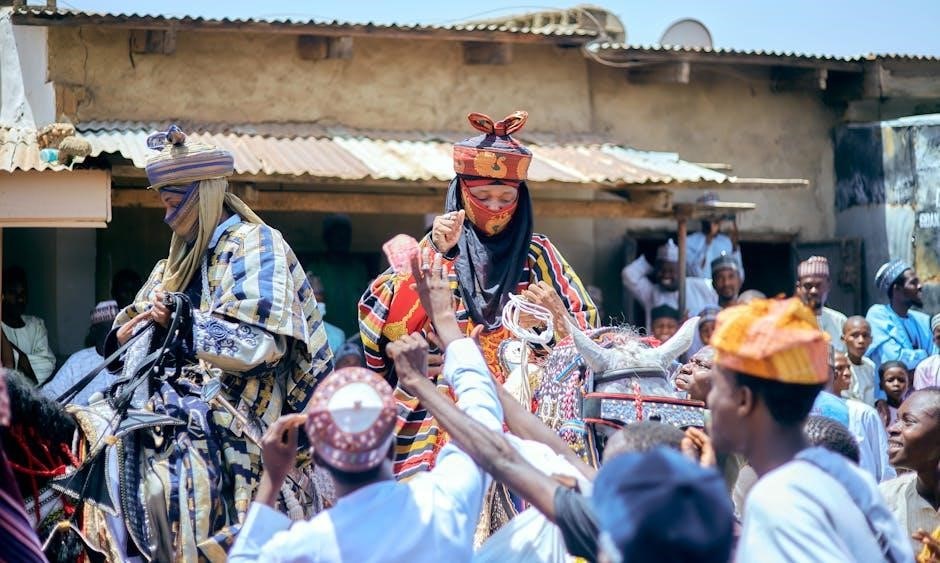Africa, despite being endowed with vast resources, faces a paradox of underdevelopment․ Historical and contemporary factors, including colonial legacies, corruption, and economic dependence, have hindered its progress, creating a complex interplay of challenges that persist today․

Historical Roots of Underdevelopment
Africa’s underdevelopment is deeply rooted in its historical exploitation, including the transatlantic slave trade and colonialism․ These systems drained resources, disrupted societies, and imposed extractive economic structures, hindering indigenous development and fostering dependency․
The Transatlantic Slave Trade
The transatlantic slave trade was a devastating system that profoundly impacted Africa’s development․ Over centuries, millions of Africans were forcibly taken from their homelands, leading to a significant loss of human capital and social disruption․ This drain of labor and skills weakened local economies and destabilized societies․ The trade also fostered internal conflicts, as some African kingdoms collaborated with European colonizers to capture and sell people, further fragmenting communities․ Additionally, the wealth generated from the slave trade was reinvested in Europe, fueling industrial growth there while leaving Africa impoverished․ The psychological and cultural trauma inflicted by the trade lingered long after its abolition, contributing to a legacy of underdevelopment․ The extraction of people and resources drained Africa’s potential for self-sustaining growth, creating a historical deficit that persists in contemporary challenges․
Colonialism and Resource Extraction
Colonialism entailed the exploitation of Africa’s resources by European powers, which significantly hindered the continent’s development․ Colonizers established extractive economic systems focused on exporting raw materials, such as gold, diamonds, and timber, to fuel their own industrial growth․ This exploitation deprived African societies of the opportunity to build diversified and self-sustaining economies․ Infrastructure projects, like railways, were constructed primarily to facilitate resource extraction rather than serve local populations․ The extraction of natural wealth without reinvestment in local industries or social services perpetuated underdevelopment․ Furthermore, colonial policies disrupted traditional systems of land ownership and agriculture, pushing many into subsistence farming․ The long-term effects of this resource extraction included environmental degradation, loss of technological advancement, and a persistent reliance on foreign capital․ These practices laid the foundation for economic dependency and limited Africa’s ability to achieve sustainable development in the post-colonial era․
Economic Exploitation During Colonialism
Colonialism in Africa was characterized by widespread economic exploitation, which profoundly impacted the continent’s development․ European powers imposed systems designed to extract resources and labor for their own economic benefit, often at the expense of local populations․ The extraction of raw materials, such as cotton, gold, and diamonds, was prioritized over building sustainable local industries, leaving African economies underdeveloped and dependent on external forces․ Traditional economies were disrupted as people were forced into labor-intensive activities, such as farming cash crops like coffee and cocoa, rather than producing food for local consumption․ This shift led to food insecurity and further entrenched poverty․ Additionally, colonial powers imposed exploitative taxation systems, which drained wealth from African societies and funneled it into colonial coffers․ The lack of investment in education, technology, and infrastructure during this period created a legacy of underdevelopment that persisted long after independence․ These practices laid the groundwork for ongoing economic challenges in post-colonial Africa․
Contemporary Issues

Africa faces numerous contemporary challenges, including corruption, political instability, and economic inequality, which collectively hinder its development and exacerbate poverty, requiring multifaceted solutions to address these deep-rooted issues effectively․
Corruption and Its Impact
Corruption remains a pervasive issue in Africa, deeply entrenched in both political and economic systems․ It undermines development by diverting resources meant for public services into private pockets, perpetuating poverty and inequality․ Many African leaders and scholars highlight corruption as a primary obstacle to progress, as it erodes trust in governance and discourages foreign investment․ The embezzlement of funds allocated for infrastructure, education, and healthcare exacerbates social inequalities, leaving millions without access to basic necessities․ Corruption also fosters political instability, as it often goes hand-in-hand with weak institutions and a lack of accountability․ For instance, cases like Nigeria’s oil revenue embezzlement and South Africa’s state capture scandals illustrate how corruption stifles economic growth and undermines development efforts․ Addressing corruption is crucial for breaking the cycle of underdevelopment, requiring robust anti-corruption measures and a commitment to transparency and good governance across the continent․
Governance Crisis
Africa’s governance crisis is a critical factor in its underdevelopment․ Weak institutions, lack of accountability, and political instability have plagued the continent, hindering effective leadership and policy implementation․ Many African nations struggle with inefficient bureaucracies, mismanagement of resources, and a disconnect between governments and their citizens․ This governance deficit often leads to poor decision-making and an inability to address pressing developmental challenges․ The crisis is further exacerbated by the legacy of colonialism, which disrupted traditional governance systems and imposed structures that prioritized extraction over sustainable development․ Additionally, political instability, often fueled by ethnic tensions or power struggles, disrupts long-term planning and creates an environment of uncertainty․ Without strong, inclusive governance, African countries find it difficult to attract investment, deliver public services, or ensure the rule of law․ Addressing this crisis requires institutional reforms, capacity building, and a commitment to democratic principles to foster stability and accountability․
Effects of Globalization

Globalization has had a dual impact on Africa, contributing to its underdevelopment in several ways․ While it has opened up markets and created opportunities for some, the continent has largely been integrated into the global economy on unfavorable terms․ African nations often find themselves at the periphery of global trade, primarily exporting raw materials while importing manufactured goods․ This perpetuates economic dependency and limits industrial growth․ Additionally, globalization has intensified competition, making it difficult for African industries to compete with cheaper, subsidized products from developed nations․ The influx of foreign goods has stifled local manufacturing, further undermining economic diversification․ Furthermore, globalization has led to the exploitation of Africa’s resources by multinational corporations, often with minimal benefits accruing to local populations․ This economic imbalance, coupled with the pressure to adopt policies favorable to global markets, has deepened inequality and hindered sustainable development․ As a result, globalization has exacerbated Africa’s underdevelopment rather than alleviating it․
Capitalism’s Role
Capitalism has played a significant role in Africa’s underdevelopment, perpetuating economic inequality and resource exploitation․ The capitalist system, driven by profit maximization, has historically led to the extraction of Africa’s natural resources for the benefit of external powers rather than local populations․ This has created a dependency on primary commodities, limiting economic diversification and industrial growth․ The exploitation of labor and resources during colonialism, under capitalist principles, laid the foundation for enduring economic disparities․ Additionally, multinational corporations often operate in Africa with minimal regard for local development, prioritizing shareholder interests over community benefits․ This has exacerbated social inequality, as wealth remains concentrated in the hands of a few, both within and outside the continent․ The capitalist model has thus hindered Africa’s ability to achieve self-sustaining economic growth, trapping many nations in a cycle of dependency and underdevelopment․
Malnutrition’s Role in Underdevelopment
Malnutrition has significantly contributed to Africa’s underdevelopment by undermining human capital and economic productivity․ Poor dietary habits, especially among children, have led to stunted growth, reduced cognitive development, and increased susceptibility to diseases․ This cycle of malnutrition perpetuates poverty, as individuals are less able to engage in productive activities or achieve educational success․ Additionally, malnutrition exacerbates existing health challenges, placing further strain on already overburdened healthcare systems․ The lack of access to nutrient-rich food, often due to poverty and food insecurity, has created a generational cycle of underdevelopment․ Addressing malnutrition is therefore critical to breaking this cycle and fostering sustainable development across the continent; By improving nutrition, Africa can unlock the full potential of its workforce, enhance educational outcomes, and build a stronger foundation for economic growth and prosperity․ Malnutrition remains a pressing issue that must be prioritized in development strategies to ensure long-term progress․
Infrastructure Deficits
Infrastructure deficits have played a significant role in Africa’s underdevelopment․ The lack of adequate transportation networks, energy supplies, and communication systems has hindered economic growth and social progress․ Poor infrastructure increases the cost of doing business, limits access to markets, and discourages foreign investment․ Many African countries struggle with unreliable electricity, which disrupts industrial production and service delivery․ Additionally, inadequate transportation systems, such as poorly maintained roads and railways, make it difficult to move goods and people efficiently, further isolating rural communities․ These deficits also impede the delivery of essential services like healthcare and education, exacerbating poverty and inequality․ Addressing infrastructure gaps is crucial for fostering economic development, improving living standards, and ensuring sustainable growth․ Without robust infrastructure, Africa’s potential remains untapped, and its development aspirations continue to face significant challenges․
Brain Drain
Brain drain has significantly contributed to Africa’s underdevelopment․ The mass emigration of skilled and educated professionals to developed countries has deprived the continent of vital human capital․ This exodus includes doctors, engineers, teachers, and researchers, many of whom seek better opportunities abroad due to limited job prospects, poor working conditions, and political instability at home․ The loss of these professionals undermines Africa’s capacity to innovate, implement development projects, and provide essential services․ For instance, the healthcare sector has been severely impacted, with many African countries facing shortages of medical personnel, exacerbating public health challenges․ Additionally, the brain drain hampers the growth of local industries and the development of technology and infrastructure․ Efforts to retain talent and encourage diaspora engagement are essential to reversing this trend and fostering sustainable development․ Without addressing brain drain, Africa risks perpetuating cycles of underdevelopment and falling further behind globally․
Political Instability
Political instability has been a persistent obstacle to Africa’s development, perpetuating cycles of conflict and undermining progress․ Frequent coups, weak governance, and power struggles have destabilized many nations, creating environments where development efforts are derailed․ Historical legacies of colonialism, which often created arbitrary borders and exacerbated ethnic tensions, have further complicated political landscapes․ Post-colonial states often inherited weak institutions ill-equipped to manage diverse populations, leading to recurring crises․ Civil wars, ethnic conflicts, and authoritarian regimes have disrupted economic growth, discouraged foreign investment, and diverted resources from essential public services․ The lack of political cohesion hinders long-term planning and policy implementation, leaving many countries unable to address pressing issues like poverty and infrastructure deficits․ Additionally, political instability fosters corruption and mismanagement, deepening societal inequalities․ Until African nations achieve sustained political stability, their development aspirations will remain hampered by recurring turmoil and ineffective governance․ Addressing these challenges requires strengthening institutions, promoting democracy, and ensuring peaceful transitions of power․
Economic Dependence on Primary Commodities
Africa’s heavy reliance on primary commodities, such as gold, diamonds, oil, and agricultural products, has perpetuated underdevelopment․ This economic dependency stems from colonial policies that prioritized resource extraction over industrialization, leaving many nations with undiversified economies․ The continent’s wealth in natural resources has not translated into sustainable development, as most countries export raw materials rather than processed goods, missing out on higher value-added profits․ This dependence makes African economies vulnerable to global price fluctuations, limiting their ability to invest in infrastructure, education, and innovation․ The lack of economic diversification exacerbates poverty and inequality, as wealth from resource extraction often benefits elites rather than the broader population․ Addressing this challenge requires shifting focus toward industrialization, value chain development, and fostering local industries to reduce reliance on volatile commodity markets and create inclusive economic growth․ Until then, many African nations will remain trapped in a cycle of economic dependency, hindering their long-term development aspirations․
Social Inequality
Social inequality is a significant barrier to Africa’s development, perpetuating poverty and limiting opportunities for marginalized groups․ Historical factors, such as colonialism and the transatlantic slave trade, disrupted social structures, creating disparities that persist today․ Wealth distribution remains uneven, with a small elite controlling resources while the majority face economic exclusion․ Education and healthcare access are often limited for the poor, trapping them in cycles of poverty․ Regional disparities further worsen inequality, as urban areas benefit from infrastructure and services unavailable in rural regions․ Gender inequality also plays a role, with women frequently excluded from decision-making and economic opportunities․ Social inequality hinders economic growth by reducing human capital potential and fostering social unrest․ Addressing inequality requires policies that promote equal access to education, healthcare, and economic opportunities, ensuring inclusive development and reducing disparities that undermine progress․ Without tackling inequality, Africa’s underdevelopment will persist, as unequal societies struggle to achieve sustainable growth․
Environmental Degradation
Environmental degradation is a critical factor contributing to Africa’s underdevelopment․ Deforestation, soil erosion, and pollution have severely impacted the continent’s natural resources, undermining agricultural productivity and exacerbating poverty․ Unsustainable practices, such as overlogging and mining, have depleted ecosystems, leading to loss of biodiversity and reduced land fertility․ Climate change has further intensified these challenges, causing frequent droughts and extreme weather events that disrupt livelihoods․ Many African communities rely heavily on natural resources for survival, making them vulnerable to environmental degradation․ This vulnerability perpetuates cycles of poverty and limits economic growth․ Additionally, environmental degradation often leads to resource scarcity, which can fuel conflicts and political instability․ Addressing environmental challenges is essential for sustainable development, requiring investments in conservation, renewable energy, and climate resilience․ Without mitigating environmental degradation, Africa’s efforts to achieve economic progress and social well-being will remain hindered, perpetuating underdevelopment and inequality across the continent․
Role of International Organizations
International organizations have played a dual role in Africa’s development trajectory, often with mixed outcomes․ While institutions like the World Bank, IMF, and UN agencies provide financial aid and technical assistance, critics argue that their policies sometimes perpetuate dependency․ Structural Adjustment Programs (SAPs) imposed by the IMF in the 1980s and 1990s, for instance, mandated austerity measures that cut public spending on education and healthcare, exacerbating poverty and inequality․ Additionally, conditional aid often aligns with donor interests rather than local needs, undermining African agency․ However, some organizations have supported infrastructure projects, health initiatives, and governance reforms, contributing positively to development․ The effectiveness of international aid depends on its alignment with African priorities and the extent to which it empowers local populations․ Despite their intentions, international organizations must address criticisms of neocolonial influence and ensure that their interventions prioritize African ownership and sustainable growth․ Balancing these dynamics remains crucial for fostering genuine development on the continent․

Solutions and Strategies

Solutions include fostering entrepreneurship, improving access to capital, and promoting sustainable agriculture․ Strengthening institutions, enhancing public-private partnerships, and leveraging technology are crucial․ Aligning strategies with African Union goals ensures sustainable growth․
Good Governance and Anti-Corruption Measures
Good governance and anti-corruption measures are critical to addressing Africa’s underdevelopment․ Corruption has drained resources, undermined institutions, and perpetuated inequality․ Strengthening governance involves transparent leadership, accountability, and rule of law․
Implementing anti-corruption policies, such as asset declarations and independent oversight bodies, can reduce graft․ Empowering civil society and media to monitor governance ensures transparency and accountability․
Additionally, international cooperation is essential to combat illicit financial flows and recover stolen assets․ By fostering ethical leadership and inclusive decision-making, Africa can build trust and allocate resources effectively for development․

Economic Diversification
Economic diversification is a cornerstone of addressing Africa’s underdevelopment․ Over-reliance on primary commodities has left many economies vulnerable to price volatility and limited industrial growth․ Diversifying into manufacturing, technology, and services can reduce dependence on extractive industries and create sustainable employment opportunities․
Investing in agriculture modernization and value chains can also enhance productivity and link rural economies to global markets․ Encouraging entrepreneurship and supporting small and medium-sized enterprises (SMEs) through access to finance and training is vital for fostering innovation and broad-based economic growth․
Examples of successful diversification, such as Kenya’s tech boom and Ethiopia’s industrial parks, demonstrate the potential for structural transformation․ However, challenges like infrastructure deficits and skills gaps must be addressed to unlock the full benefits of economic diversification, paving the way for inclusive and resilient development across the continent․
Education and Skills Development
Education and skills development are critical for overcoming Africa’s underdevelopment․ Many African countries face challenges such as limited access to quality education, outdated curricula, and a mismatch between educational outputs and labor market needs․ These issues perpetuate unemployment and hinder economic growth․
Investing in education infrastructure, teacher training, and vocational programs can equip Africans with the skills required for modern industries․ Emphasizing science, technology, engineering, and mathematics (STEM) education is particularly important for fostering innovation and competitiveness in a globalized economy․

Moreover, addressing barriers to education, such as gender disparities and financial constraints, is essential for ensuring inclusivity․ Public-private partnerships and international collaborations can support these efforts, enabling African nations to build a workforce capable of driving sustainable development and reducing reliance on foreign expertise․
Regional Cooperation
Regional cooperation is a vital strategy for addressing Africa’s underdevelopment․ By fostering economic integration and collective problem-solving, organizations like the African Union (AU) and the Economic Community of West African States (ECOWAS) aim to enhance unity among member states․ These efforts promote resource sharing, trade expansion, and infrastructure development, which are essential for reducing dependency on external economies and strengthening local industries․

For example, joint infrastructure projects can create transnational transportation networks and energy systems, boosting economic activities across borders․ However, challenges such as differing national priorities, political instability, and conflicts hinder effective collaboration․ Additionally, varying levels of economic development and capacity among member states can create disparities in the distribution of benefits․
Addressing these issues requires commitment to common goals and willingness to compromise․ Successful regional cooperation can lead to greater negotiating power on the global stage and more favorable international partnerships, ultimately contributing to Africa’s sustainable development․

International Community’s Role
The international community plays a dual role in Africa’s underdevelopment․ On one hand, global systems of capitalism and globalization have historically exploited Africa’s resources, perpetuating inequality and dependency․ Institutions like the International Monetary Fund (IMF) and the World Bank have imposed structural adjustment programs that often prioritize debt repayment over social welfare, exacerbating poverty and limiting economic sovereignty․
On the other hand, international aid and development programs have provided critical support, funding infrastructure projects, healthcare, and education․ However, these efforts are often fragmented, misaligned with local needs, or undermined by corruption․ Additionally, foreign powers frequently pursue self-interested agendas, such as accessing natural resources, which can hinder long-term development․
True progress requires the international community to adopt equitable partnerships, prioritize African-led solutions, and address systemic inequities in global trade and finance․ Without genuine commitment to fostering self-sufficiency and reducing dependency, external interventions may continue to perpetuate underdevelopment rather than alleviate it․
Case Studies and Examples
Africa’s underdevelopment is vividly illustrated through various case studies․ The Democratic Republic of Congo (DRC), for instance, exemplifies how resource wealth coexists with poverty․ Despite vast mineral reserves, decades of colonial exploitation, political instability, and corruption have stifled development․ Similarly, Nigeria, Africa’s largest economy, struggles with widespread poverty due to oil dependency and mismanagement of resources․
South Africa, despite being the continent’s most industrialized nation, grapples with deep inequality and unemployment, rooted in its apartheid legacy․ These examples highlight how historical and contemporary factors intersect to perpetuate underdevelopment․ They demonstrate the need for tailored solutions addressing specific contexts rather than one-size-fits-all approaches․
- DRC: Resource-rich yet impoverished due to exploitation and instability․
- Nigeria: Oil wealth contrasts with widespread poverty and inequality․
- South Africa: Apartheid’s legacy persists in economic disparities․
These cases underscore the complex interplay of history, governance, and external factors in Africa’s underdevelopment․
Africa’s underdevelopment is a multifaceted issue rooted in historical injustices, colonial legacies, and contemporary challenges such as corruption, governance crises, and economic dependence․ Addressing these issues requires comprehensive strategies, including good governance, economic diversification, and investment in education and infrastructure․
The continent’s future prospects lie in harnessing its vast resources and youthful population․ Regional cooperation, international partnerships, and a commitment to anti-corruption measures are essential for sustainable development․ While the path ahead is challenging, there is hope for transformation through targeted interventions and collective action․
Ultimately, breaking the cycle of underdevelopment demands empowerment at all levels, ensuring that Africa’s potential is realized for the benefit of its people․ The journey toward prosperity is long but achievable with determination and unity․